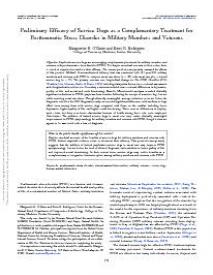Preliminary Efficacy of Service Dogs as a Complementary Treatment for Posttraumatic Stress Disorder in Military Members and Veterans
Objective: Psychiatric service dogs are an emerging complementary treatment for military members and veterans with posttraumatic stress disorder (PTSD). Yet despite anecdotal accounts of their value, there is a lack of empirical research on their efficacy. The current proof-of-concept study assessed the effects of this practice.
Method: A nonrandomized efficacy trial was conducted with 141 post-9/11 military members and veterans with PTSD to compare usual care alone (n 66) with usual care plus a trained service dog (n 75). The primary outcome was longitudinal change on The PTSD Checklist (PCL; Weathers, Litz, Herman, Huska, & Keane, 1993), including data points from a cross-sectional assessment and a longitudinal record review. Secondary outcomes included cross-sectional differences in depression, quality of life, and social and work functioning.
Results: Mixed-model analyses revealed clinically significant reductions in PTSD symptoms from baseline following the receipt of a service dog, but not while receiving usual care alone. Though clinically meaningful, average reductions were not below the diagnostic cutoff on the PCL. Regression analyses revealed significant differences with medium to large effect sizes among those with service dogs compared with those on the waitlist, including lower depression, higher quality of life, and higher social functioning. There were no differences in employment status, but there was lower absenteeism because of health among those who were employed.
Conclusion: The addition of trained service dogs to usual care may confer clinically meaningful improvements in PTSD symptomology for military members and veterans with PTSD, though it does not appear to be associated with a loss of diagnosis.
What is the public health significance of this article? Despite anecdotal accounts of the benefits of service dogs for military members and veterans with PTSD, limited empirical evidence exists to document their efficacy. This proof-of-concept study suggests that the addition of trained psychiatric service dogs to usual care may improve PTSD symptomology, but not below the level of clinical diagnosis, and contribute to better quality of life and improved social functioning. In their current form, service dogs may confer benefits as a complementary or integrative treatment option among military members and veterans with PTSD.
Geachte bezoeker,
De informatie die u nu opvraagt, kan door psychotraumanet niet aan u worden getoond. Dit kan verschillende redenen hebben,
waarvan (bescherming van het) auteursrecht de meeste voorkomende is. Wanneer het mogelijk is om u door te verwijzen naar de bron
van deze informatie, dan ziet u hier onder een link naar die plek.
Als er geen link staat, kunt u contact opnemen met de bibliotheek,
die u verder op weg kan helpen.
Met vriendelijke groet,
Het psychotraumanet-team.
In: Journal of Consulting and Clinical Psychology, ISSN 0022-006X ; eISSN 1939-2117 | 86 | 2 | 179-188
http://doi.org/10.1037/ccp0000267


